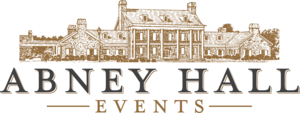Your Magic Moment Awaits
Your wedding day. Without a doubt, it's one of the most significant events you will ever experience - when you and the love of your life officially seal the deal and get married. On this day, your friends and family will gather to celebrate the next step in your life. Photographers will be running around snapping photos, catering plates delicious food for guests to enjoy, and the DJ sets the mood for a night of fun and libation. You've worked extra hard to make everything look perfect and run smoothly. You have examined every moving part down to the tiniest detail. At the center of all your effort is your wedding venue in Charleston, SC.
Your event space can mean the difference between an unforgettable event and an average occasion. Capturing your uniqueness as a couple is paramount to a memorable wedding. But, without the right venue location and staff, your unforgettable event can turn into a painfully average occasion. Fortunately, at Abney Hall, you won't ever have to worry about dingy reception spaces and crummy chow halls.
Constructed in Charleston, SC, in 1962, Abney Hall is 15,000 square feet and sits on 500 acres of land, making it a large wedding venue unlike any other. Abney Hall was originally the home of Mrs. Josephine Abney, a Charleston native who was a lifelong philanthropist. Mrs. Abney devoted much of her time and effort towards supporting charities, educational institutions, hospitals, and other noble efforts. Today, Abney Hall stands tall as a symbol of love, both in our community and for the couples who choose to get married here.
Abney Hall is an exclusive event experience unlike any other, surrounded by verdant forests and sparkling ponds. Our venue is a natural fit for several occasions, including:

Weddings

Bridal Showers

Bridal Portraits
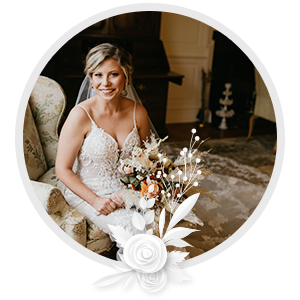
Rehearsal Dinners
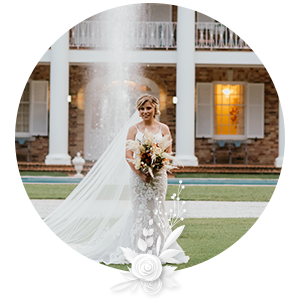
Corporate Events

Much More!
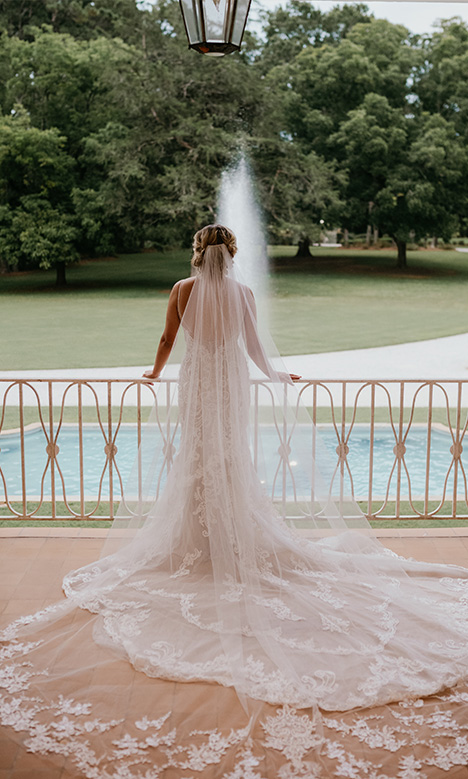
The Top Wedding Venue in Charleston, SC
The beginning of your life starts at Abney Hall. With our team by your side, we can create the fairy tale wedding you have dreamed about since childhood. Whether you have 100 guests or 1,000, our waterfront ceremony locations and French-inspired courtyard are perfect for your big day. Celebrate in luxurious style surrounded by shady magnolia trees, a private forest, large ponds, and the beauty of Mother Nature. While our venue location and aesthetic have been praised far and wide, so too have the practical aspects of Abney Hall. Looking for a relaxing, comfortable spot for your bridal party to get ready in? We offer an entire floor in the Abney Hall residence to get the bridal party ready. Want to make your groomsman feel extra-special too? We've got a private, plush house just feet from a sparkling pond that is a proper hangout spot for the guys in your group.
To make life easier on you, we also offer Abney Hall as your go-to spot for rehearsal dinners. Why book an expensive restaurant or travel to another location when unmatched beauty and convenience are right at your fingertips? Abney Hall is just the place for that very important dinner the night before your big day. We are also happy to host your bridal shower at Abney Hall. Our venue makes for one of Charleston's most unique bridal shower settings, where your family and friends can gather to give gifts and be merry before you walk down the aisle.
With such a large, magnificent house and a vast property, Abney Hall also makes for an unforgettable location for your bridal portraits and other wedding-related photography needs. Don't take our word for it - book a tour and see for yourself why so many new brides and grooms choose Abney Hall as their wedding venue in Charleston.
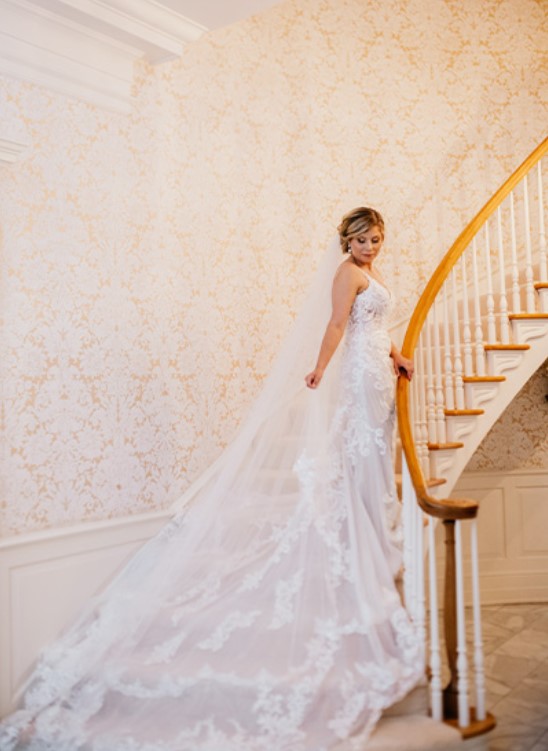
What Sets Abney Hall Apart from Other Wedding Venues in Charleston?
You've already found the person you want to spend the rest of your life beside. The next step? Finding the perfect wedding venue for your ceremony, reception, and celebration of your lifelong commitment to one another. Remember, the backdrop for photos, dancing, eating, and all other activities will be at your wedding venue. That's why we work so hard to set Abney Hall apart from our competitors - so you and your guests can focus on love and living your new life while we work with your vendors and photographers to make your magic night a reality.
Here are just a few reasons why guests choose Abney Hall as their wedding venue in Charleston, SC, along with some helpful tips from our experienced wedding venue staff:
Venue Size
Choosing the appropriate-sied venue for your desired guest count is a critical decision. A venue's capacity affects the number of people you need to consider having at your ceremony and reception. As you're first starting out, we recommend having a guest count in mind as you're searching for the right venue. Try to stick with that number. You may fall in love with a particular venue, but if its max capacity can't accommodate your guest count, it may be time to cross them off your list.
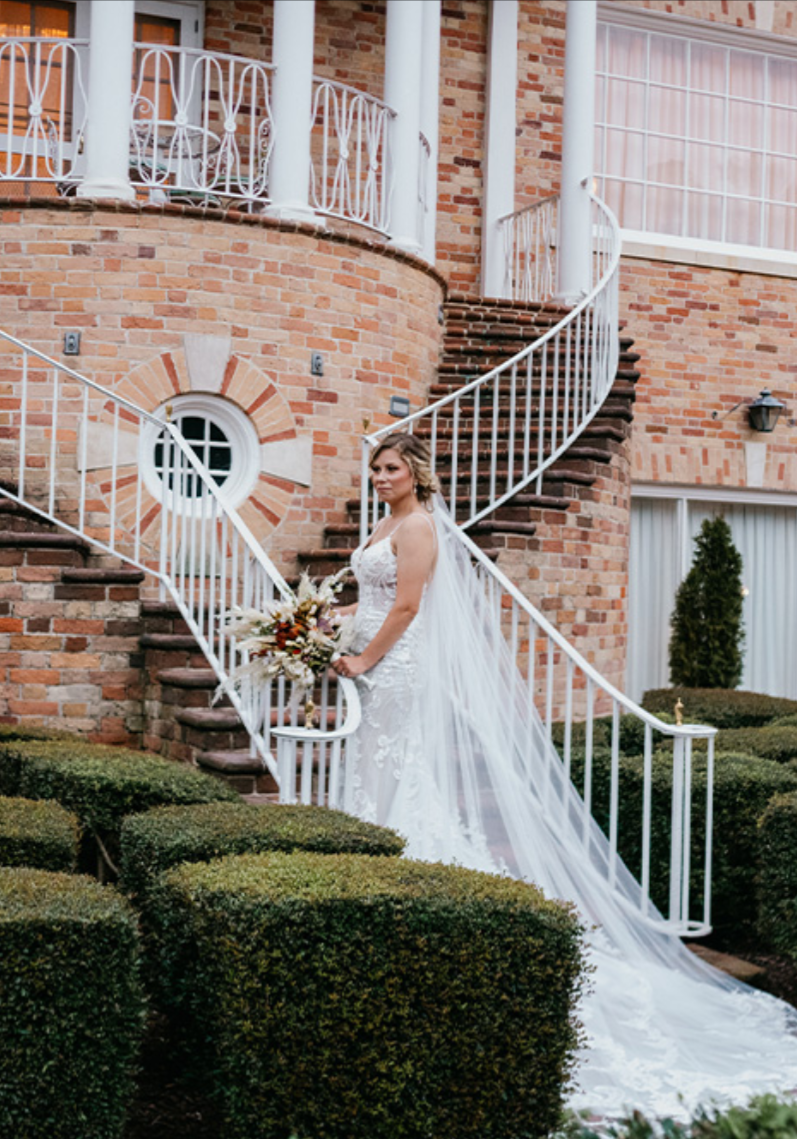

Abney Hall Pro Tip:
Keep in mind that this is your big day. You shouldn't feel obligated to invite the college roommate you shared a dorm with for one semester. At the end of the day, your wedding venue should be one that can accommodate those closest to you. Abney Hall is equipped for both small and large weddings, consisting of 500 acres of forest, ponds, and lush natural beauty. Whether you want an intimate wedding with only your best friends or a grand ceremony with hundreds of people, we have the right amount of room to make you comfortable.
Location and Nearby Lodging
On your big day, you're likely to have friends and family traveling in from other parts of the state or country. These folks will need a place to stay during and even after your wedding. Accessibility and ease are important factors when it comes to choosing your wedding venue for both you and your guests.
Located in Charleston, SC, Abney Hall is situated in a memorable, natural setting, giving your wedding a private vibe in the midst of Mother Nature. While we pride ourselves on having a secluded wedding event space, our venue is within an easy driving distance of hotels and vacation rentals.

Abney Hall Pro Tip:
When you contact us for a tour, make sure to speak with our experienced venue manager about nearby hotels and shuttle service options. We understand that your guest's comfort and convenience are important, and we're happy to work with you to figure out the best way to get your guests to Abney Hall.
Venue Staff
At Abney Hall, our staff has earned its reputation as one of the industry's most friendly, accessible teams. We will provide you with a purpose-minded point of contact that can help answer questions relating to timelines, preferred vendors, and every aspect of your wedding. When you tour our wedding venue in Charleston, SC, for the first time, we want you to feel like you have all the information you need to make an informed purchasing decision.
We would be happy to go over:
- Venue Pricing
- Ceremony Specifics
- Reception Specifics
- Catering Possibilities
- Decorating Possibilities
- Entertainment Options
- Photography and Photo Opportunities
- Venue Amenities
- Bridal Party Needs
- Groomsman Needs
At Abney Hall, our goal is to be your first resource when it comes to setting up and coordinating the details of your wedding day.
Decor
When it comes to your wedding's decor, you probably already have a few ideas in mind. We love it when our brides and grooms have a vision in mind because one of our greatest joys is turning that vision into a reality. At Abney Hall, our team is available to help you and your decorator fit, accent, and accommodate your fairy-tale wedding - whatever that may be.
Are you looking to dress up your wedding with decorations galore? Just want to add a few accents that tie into your preferred color palette? Abney Hall is versatile and ready to help however we are able.
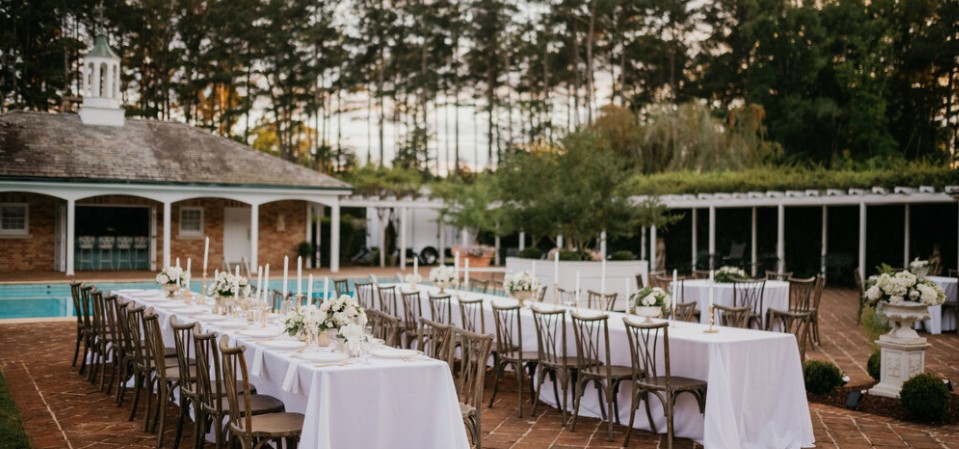

Abney Hall Pro Tip:
If you're thinking about bringing in your own greenery, lighting, floral pieces, and more, we recommend discussing your vision with us on your initial tour of our event space. That way, we can get a head start on making your big day exactly how you envision it.
Photo Opportunities
10 years from now, when you and your spouse are celebrating your anniversary, you will pull out photographs from your wedding and will reminisce about the unforgettable time you spent at Abney Hall. Your wedding photos will be with you forever, and as such, we work closely with you and your photographer to suggest extra-special photo op spots that you can only find on Abney Hall grounds.
From the grand staircase and French-inspired courtyard to our manicured gardens and lovely pond, there is no shortage of photo-op locations for your photographer to choose from. As one of the most popular wedding venues in Charleston, SC, we have worked with dozens of photographers over the years.
Our experience has allowed us to cultivate a list of preferred photographers - all of whom have the talent to take your pictures to the next level in a setting they're familiar with. We encourage you to check out our gallery to get a sense of the scope of our wedding venue and gain inspiration from other happy couples.

Abney Hall Pro Tip
The gallery on our website is extensive but be sure to check out our Facebook and Instagram pages as well. We keep our social pages updated with recent wedding photographs, giving you an incredible resource that you can use for your own photography purposes.
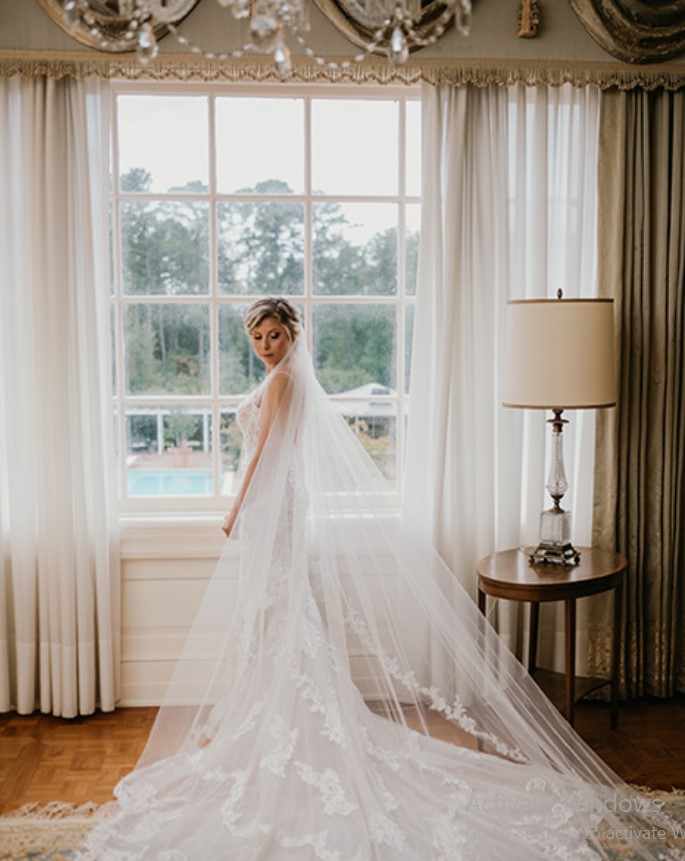
The Premier Corporate Event Venue in Charleston, SC
Abney Hall is known across the United States for our stunning weddings, but we also play host to some of the largest corporate events in South Carolina. Why choose a bland, lifeless meeting space when you can enjoy the beauty of Mother Nature coupled with a professional atmosphere? If you have an important team-building event or corporate conference that you have to coordinate, look no further than Abney Hall.
The epitome of class and style, our corporate event space is large, lavish, and chock-full of onsite amenities for you and your co-workers to enjoy. If your team needs a morale boost, don't bring them to the local Olive Garden for a cheap lunch. Treat them to a refreshing experience in our main dining room, where we can work with you to incorporate your catering options with the goals of your event.
When the hard work is done, and your team needs a breather, what better way to relax than with a quick dip in our pool? To burn off a little steam, head over to our brand-new tennis court - the perfect place to get some exercise in an ultra-private setting while you enjoy the sights and sounds of nature. Don't forget to bring your fishing poles for a couple of hours of fishing. There's even an opportunity to go hunting if you wish.
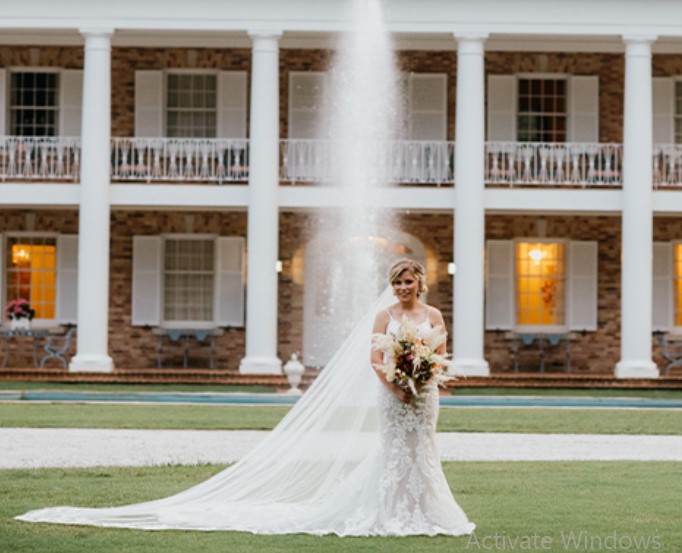
Elegance at Its Finest - Only
a Phone Call Away
If you're ready to learn more about Abney Hall as your wedding venue, don't hesitate to reach out. We would love to hear more about your plans, your vision, and your needs. We know that planning a wedding isn't easy. It takes time, attention to detail, and a whole lot of patience. Our goal is to help provide you with all the info you need to learn more about our venue. Once you decide on a date, we'll work closely with you and your vendors to craft a wedding experience that you will treasure for the rest of your life.
Our available dates for your big day are going quick, especially during peak seasons like spring and fall. We look forward to hearing from you soon!
Contact us today for a FREE initial consultation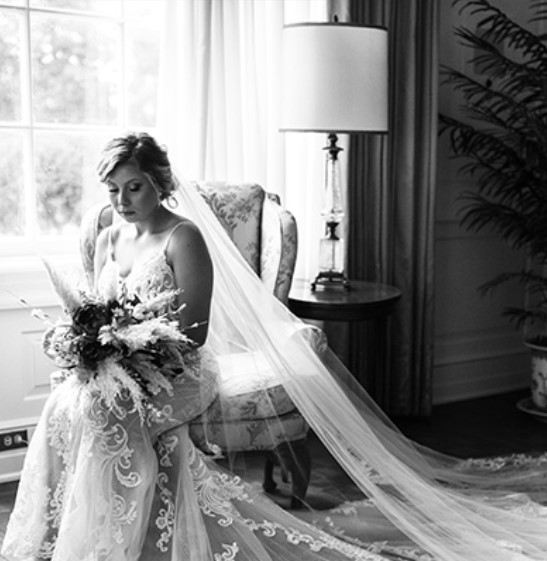
Latest News in Charleston, SC
Where to Drink in Charleston Right Now, April 2024
Erin Perkinshttps://carolinas.eater.com/maps/best-new-cocktail-bar-charleston
There's a wealth of opportunities for imbibing in Charleston, but where to find the latest and greatest? The newest and hottest? Here's an updated Cocktail Heatmap of places to visit as soon as happy hour hits. While this map focuses on restaurants and bars that have opened within the past year, we've also included some older establishments undergoing a new heatwave thanks to recent changes to their cocktail menus or bar program.We've also included some newer wine and beer bars for those not in need of a super stiff drink. Go out and ...
There's a wealth of opportunities for imbibing in Charleston, but where to find the latest and greatest? The newest and hottest? Here's an updated Cocktail Heatmap of places to visit as soon as happy hour hits. While this map focuses on restaurants and bars that have opened within the past year, we've also included some older establishments undergoing a new heatwave thanks to recent changes to their cocktail menus or bar program.
We've also included some newer wine and beer bars for those not in need of a super stiff drink. Go out and try somewhere new this week — perhaps you'll find a new favorite libation or bartender in town.
Eater maps are curated by editors and aim to reflect a diversity of neighborhoods, cuisines, and prices. Learn more about our editorial process.
The owners of downtown bar Dalila’s have a new spot in Park Circle. Sissy Bar, named after owner Michael Whiteley’s twin daughters, specializes in tequila, mezcal, and Southern California cuisine. Look for breakfast burritos during Sunday brunch and tacos during dinner.
To match the playful spirit at Chinese barbecue spot King BBQ, bar manager Amy Kallicragas created a rainbow’s worth of cocktails to sip with the smoked meats. For dirty martini lovers, there’s the Shimmy Shimmy Ya with a kick from a pickled pepper. Margarita fans will like the Eye of the Tiger made with tequila, Thai tea, and mandarin.
The crew behind Daps recently opened a sports bar focused on community and good food. The drinks are super fun. There are cocktails with names like Nothing But (fer)NET, a mix of Fernet, rum, and Thai tea, and frozen spiked Gatorade, in addition to wines on draft and tons of beers.
The cocktail list at Beautiful South adds even more depth to the Cantonese cuisine at Beautiful South. Bar manager Lily Cantral (formerly of the Ordinary and FIG) serves creative drinks like the house martini made with sesame gin, Fino sherry, vermouth, and MSG.
Tucked away in the Cannonborough/Elliotborough neighborhood, Philosophers & Fools is a cozy, contemporary bookshop that also serves beer, wine, and snacks. Customers can pick up a new title and take a seat at the bar to order a glass of albariño.
The Quinte Oyster Bar is back, and it’s been stripped of some of its preciousness, but it’s still a pretty sexy spot to grab a martini and try the lobster bao or kimchi butter oysters.
Stop by the attractive dark wood bar at Lowland Tavern and find equally attractive people sipping martinis with dots of herb oil and snacking on chef Jason Stanhope’s fancy pub fare. Also check out the highly selective wines-by-the-glass menu.
Bearcat, a fine dining restaurant without the fuss, recently opened its bar in the Avondale neighborhood. Drinks range from a fancy frozen strawberry daiquiri with chartreuse to Coors beer. The big draw is the snacks, like wood-fired oysters with wagyu fat or the tartare with Carolina Gold rice.
The group behind the Emeline Hotel and Italian restaurant Frannie & the Fox recently opened the intimate (and slightly hidden) bar the Den. The space seats 30 and focuses on martinis, caviar, and Italian snacks. Seasonal flavors like a tomato martini share the menu with a classic martini service featuring various liquor and vermouth choices.
The new French Quarter establishment the Peacock (formerly known as the Habit) is billed as a “multi-tiered entertainment experience.” The first floor holds the main dining and a large bar; there’s another bar and a lounge area for live entertainment on the second floor; and the third floor holds a rooftop bar that overlooks the harbor. The bars are fully stocked with beer, wine, and liquors and offer signature drinks like the Ain’t Misbehavin’ which is a dirty martini with blue cheese-stuffed olives.
The gilded bar at Costa faces the floor-to-ceiling windows and makes for a stunning backdrop to end the day with a spritz or an Italian wine. Order ceviche or a plate of oysters if you’re feeling peckish — or go big with a giant plate of eggplant Parmesan from chef Vinson Petrillo.
Food and beverage vets Danielle and Brent Sweatman recently opened Sweatman’s Garden in the South Windermere Shopping Center with fancy sodas, a full bar, and fondue. All of the sodas are nonalcoholic, but for an extra $5, the bartenders can add the customer’s choice of house liquor or a cannabis-based infusion.
Johns Island restaurant Lost Isle comes from the proprietors of Folly Beach bar Lowlife, so you know they paid careful attention to the bar menu. Lost Isle has several beers, cocktails, and wines all on tap, from the outdoor bar. “We wanted the drinks to be tasty, fun, and accessible — not too pretentious or complex,” says co-owner T.J. Lynch, “We hope you’ll have a good time and not have to worry so much about what’s in the glass.”
James Island spot the Harlow wins the contest for the best puns on its menu with the Harbor View Carre (a play on Harbor View Road and the classic vieux carre cocktail). If you’re not in the mood for bourbon and Benedictine, try the Dill Creek martini, which tastes like a boozy pickle, in a good way.
Yes, there’s a margarita on the menu at Mexican restaurant Colectivo, but customers can explore other fun drinks made with agave spirits, like the Next Epazote with mezcal, Nixta (corn liquor), lemon, and epazote (a Mexican herb).
Always-packed downtown brewery Revelry set up a second location at Folly Beach, so now beer lovers can enjoy a fresh pint of Poke the Bear (a popular pale ale) and order food from nearby Bounty Bar.
The owners of downtown bar Dalila’s have a new spot in Park Circle. Sissy Bar, named after owner Michael Whiteley’s twin daughters, specializes in tequila, mezcal, and Southern California cuisine. Look for breakfast burritos during Sunday brunch and tacos during dinner.
To match the playful spirit at Chinese barbecue spot King BBQ, bar manager Amy Kallicragas created a rainbow’s worth of cocktails to sip with the smoked meats. For dirty martini lovers, there’s the Shimmy Shimmy Ya with a kick from a pickled pepper. Margarita fans will like the Eye of the Tiger made with tequila, Thai tea, and mandarin.
The crew behind Daps recently opened a sports bar focused on community and good food. The drinks are super fun. There are cocktails with names like Nothing But (fer)NET, a mix of Fernet, rum, and Thai tea, and frozen spiked Gatorade, in addition to wines on draft and tons of beers.
The cocktail list at Beautiful South adds even more depth to the Cantonese cuisine at Beautiful South. Bar manager Lily Cantral (formerly of the Ordinary and FIG) serves creative drinks like the house martini made with sesame gin, Fino sherry, vermouth, and MSG.
Tucked away in the Cannonborough/Elliotborough neighborhood, Philosophers & Fools is a cozy, contemporary bookshop that also serves beer, wine, and snacks. Customers can pick up a new title and take a seat at the bar to order a glass of albariño.
The Quinte Oyster Bar is back, and it’s been stripped of some of its preciousness, but it’s still a pretty sexy spot to grab a martini and try the lobster bao or kimchi butter oysters.
Stop by the attractive dark wood bar at Lowland Tavern and find equally attractive people sipping martinis with dots of herb oil and snacking on chef Jason Stanhope’s fancy pub fare. Also check out the highly selective wines-by-the-glass menu.
Bearcat, a fine dining restaurant without the fuss, recently opened its bar in the Avondale neighborhood. Drinks range from a fancy frozen strawberry daiquiri with chartreuse to Coors beer. The big draw is the snacks, like wood-fired oysters with wagyu fat or the tartare with Carolina Gold rice.
The group behind the Emeline Hotel and Italian restaurant Frannie & the Fox recently opened the intimate (and slightly hidden) bar the Den. The space seats 30 and focuses on martinis, caviar, and Italian snacks. Seasonal flavors like a tomato martini share the menu with a classic martini service featuring various liquor and vermouth choices.
The new French Quarter establishment the Peacock (formerly known as the Habit) is billed as a “multi-tiered entertainment experience.” The first floor holds the main dining and a large bar; there’s another bar and a lounge area for live entertainment on the second floor; and the third floor holds a rooftop bar that overlooks the harbor. The bars are fully stocked with beer, wine, and liquors and offer signature drinks like the Ain’t Misbehavin’ which is a dirty martini with blue cheese-stuffed olives.
The gilded bar at Costa faces the floor-to-ceiling windows and makes for a stunning backdrop to end the day with a spritz or an Italian wine. Order ceviche or a plate of oysters if you’re feeling peckish — or go big with a giant plate of eggplant Parmesan from chef Vinson Petrillo.
Food and beverage vets Danielle and Brent Sweatman recently opened Sweatman’s Garden in the South Windermere Shopping Center with fancy sodas, a full bar, and fondue. All of the sodas are nonalcoholic, but for an extra $5, the bartenders can add the customer’s choice of house liquor or a cannabis-based infusion.
Johns Island restaurant Lost Isle comes from the proprietors of Folly Beach bar Lowlife, so you know they paid careful attention to the bar menu. Lost Isle has several beers, cocktails, and wines all on tap, from the outdoor bar. “We wanted the drinks to be tasty, fun, and accessible — not too pretentious or complex,” says co-owner T.J. Lynch, “We hope you’ll have a good time and not have to worry so much about what’s in the glass.”
James Island spot the Harlow wins the contest for the best puns on its menu with the Harbor View Carre (a play on Harbor View Road and the classic vieux carre cocktail). If you’re not in the mood for bourbon and Benedictine, try the Dill Creek martini, which tastes like a boozy pickle, in a good way.
Yes, there’s a margarita on the menu at Mexican restaurant Colectivo, but customers can explore other fun drinks made with agave spirits, like the Next Epazote with mezcal, Nixta (corn liquor), lemon, and epazote (a Mexican herb).
Always-packed downtown brewery Revelry set up a second location at Folly Beach, so now beer lovers can enjoy a fresh pint of Poke the Bear (a popular pale ale) and order food from nearby Bounty Bar.
Mount Pleasant-based bank sets eye on next local expansion market
John McDermott jmcdermott@postandcourier.comhttps://www.postandcourier.com/business/mount-pleasant-summerville-beacon-community-bank-branch/article_bf63417e-f67c-11ee-9ba0-df4f45340763.html
South Carolina's first federally chartered startup lender in years is eyeing its next outpost.Mount Pleasant-based Beacon Community Bank is looking to redevelop a former Circle K service station and convenience store at 527 N. Main St. in downtown Summerville.The deal is subject to a proposed environmental cleanup and land-reuse plan filed by VCKH’s Magnolia LLC with the S.C. Department of Health and Environmental Control in late MarchThe applicant...
South Carolina's first federally chartered startup lender in years is eyeing its next outpost.
Mount Pleasant-based Beacon Community Bank is looking to redevelop a former Circle K service station and convenience store at 527 N. Main St. in downtown Summerville.
The deal is subject to a proposed environmental cleanup and land-reuse plan filed by VCKH’s Magnolia LLC with the S.C. Department of Health and Environmental Control in late March
The applicant is owned by local car dealer Tommy Baker, who also is Beacon's chairman and co-founder. It plans to acquire the nearly half-acre corner property "and intends to redevelop the property with a bank," according to the document.
"The property was formerly a gas station. The past use of the property or adjoining properties may have caused environmental pollution on the property," the filing stated.
The public comment period on the cleanup proposal runs through May 1.
Fast-moving Beacon opened its sixth branch in five years in 2023 when it expanded into the North Charleston market and bolstered its existing East Cooper presence by opening a new corporate headquarters and retail office along U.S. Highway 17 across from Boone Hall Farms.
The bank opened its doors in early 2018 on East Bay Street in downtown Charleston after raising about $34 million from more than 320 local investors led by Baker of Baker Motor Co. Beacon's other branches are in Mount Pleasant and one on Daniel Island.
Split decision
The dozens of newcomers who relocate to the Charleston region each week won't include the "Golden Bachelor" and his new bride after all.
Gerry Turner and Theresa Nist, who tied the knot in a TV wedding about three months ago, went on ABC's Good Morning America last week to announce they've decided to part ways. Turner filed the papers to make it official, citing an “irretrievable breakdown” of their new marriage
"Theresa and I have had a number of heart-to-heart conversations, and we've looked closely at our situation, our living situation, so forth and — and we've kind of come to the conclusion mutually that it's probably time for us to dissolve our marriage," he said on the morning show.
Shortly after Turner picked Nist to be his bride on the ABC reality show, the 70-something engaged couple told People magazine they were considering a move to Charleston from their residences in Indiana and New Jersey, partly because her son and family live nearby.
“We looked at home after home, but we never got to the point where we made that decision," Nist said on GMA.
All best
Three South Carolina towns were named as the “Most Beautiful Coastal Towns in the South” by Southern Living.
Charleston, Georgetown and Beaufort made the list, as well as cities in North Carolina, Mississippi, Alabama, Texas, Florida, Virginia and Maryland.
Beaufort, which ranked No. 4 out of 15 on the list, was chosen because of the amenities of Waterfront Park, the 100-slip marina, its downtown charm and its proximity to Hunting Island State Park.
“Beaufort’s Waterfront Park is a great place to get wide-open waterfront views as you take a sunset stroll,” Southern Living writers described in the ranking.
Charleston was No. 7, with mentions of the dining, shopping and cultural offerings, its proximity to the barrier island beach towns.
“To be fair, the Holy City comes to mind for a lot when we’re talking about great Southern vacation destinations … There’s not much you can’t find in Charleston,” according to Southern Living.
Ranked No. 13, Georgetown was hailed as the “crowned jewel of South Carolina’s Hammock Coast, a string of six towns bookended by Myrtle Beach and Charleston, Georgetown offers all the same charms of Charleston with far fewer crowds.”
The selections were made by Southern Living editors who research and visit destinations across the region.
Upstate acquisition
A Lowcountry concrete business is cementing its footprint in South Carolina with an Upstate acquisition.
Summerville-based Knight’s Companies and its Knight’s Precast division recently bought MST Concrete Products Inc. of Pendleton.
Financial terms were not disclosed.
Knight’s Precast said it plans to open two new Upstate locations, in Central and in Pendleton. CEO Pete Knight called the deal an "exciting step in our companywide expansion strategy."
Family-owned Knight’s offers septic, ready-mixed concrete, precast concrete, trucking and concrete-pumping services, as well as steel reinforcement products to commercial and residential customers with plants in Summerville and Richmond Hill, Ga.
Our twice-weekly newsletter features all the business stories shaping Charleston and South Carolina. Get ahead with us - it's free.
State agency, nonprofit need help at oyster shell recycling event
Autumn Kleinhttps://www.live5news.com/2024/04/16/state-agency-nonprofit-partner-speed-up-oyster-shell-recycling/
JAMES ISLAND, S.C. (WCSC) - A South Carolina agency and a Lowcountry nonprofit are teaming up Tuesday afternoon to reach their goal of restoring the marshes and cleaning the environment, but they need the help of volunteers.The South Carolina Department of Natural Resources and Charleston Waterkeeper have teamed up to host Oyster Shell Litter Cleanups. Oyster shell recycling provides environmental benefits including erosion control, water filtering and habitats for fish and shellfish.The challenge with oyster shell recycling is...
JAMES ISLAND, S.C. (WCSC) - A South Carolina agency and a Lowcountry nonprofit are teaming up Tuesday afternoon to reach their goal of restoring the marshes and cleaning the environment, but they need the help of volunteers.
The South Carolina Department of Natural Resources and Charleston Waterkeeper have teamed up to host Oyster Shell Litter Cleanups. Oyster shell recycling provides environmental benefits including erosion control, water filtering and habitats for fish and shellfish.
The challenge with oyster shell recycling is that they need to be completely cleaned before being returned to the marshes and they often end up mixed in with trash items like saltine wrappers, beer cans and sauce cups.
SCDNR and Waterkeeper are seeking volunteers to help them sort through and remove the debris of these recycled oyster shells. Volunteers will get dirty, so they recommend wearing close-toed shoes and clothes that can get messy. The groups will provide buckets, gloves, trash pickers, sunscreen and bug spray.
Representatives from SCDNR and Waterkeeper say that the help of volunteers has a huge impact on both the environment and their organizations. SCDNR’s Oyster Shell Recycling and Plant Program Coordinator Holly Sommers says that SCDNR used to sort through the shells and litter all on their own, so having volunteers allows them to clean a greater amount in a much more efficient and effective manner.
“Without volunteers, we would not be able to accomplish what we have. So, with that, we really appreciate everybody who comes out and takes their time to help us clean the oyster shell,” she says. “Know that you as the individual, the caterers that are out there and the restaurants that are participating in our shell recycling program, SCDNR cannot do it without you. And we really appreciate the time, energy and effort that goes into supporting us and every bushel counts. So thank you.”
Sommers says you can truly make a difference in protecting and supporting your shorelines.
South Carolina has a critical shortage of oyster shells, according to SCDNR’s Oyster Recycling and Enhancement program. Sommers says that this is the time of year that they begin deploying the shells on the shorelines so it is a busy time of year for oyster shell recycling, and removing the trash is a very important step.
They also began collecting detailed data on the trash they find. They use these numbers to provide to local restaurants and caterers to educate them. Last year, the organizations collected around 1,700 pounds of trash and debris from these events. The trash they find can be small items so Sommers says collecting exact numbers can have a bigger impact.
“It is a lot of Saltine wrappers and like those materials that don’t weigh a lot, that’s why collecting more specific data is important. Because numbers are impactful, you know, so when we can say we found thousands of Saltine wrappers this past year compared to, you know, five pounds of the wrappers, the numbers make a difference,” she says.
The next Oyster Shell Litter Cleanup will take place Tuesday from 1 p.m. to 3 p.m.
To volunteer, you must sign up online at this website.
Volunteers must be at least 10 years old to participate and accompanied by a guardian if under the age of 18. All they ask is that you bring a photo ID and a water bottle. Volunteers are to meet at the parking lot at the intersection of Noisette Boulevard and Turnbull Street in North Charleston. They will caravan to the site from there after a short debriefing and sign-in process.
Charleston Waterkeeper Staff Scientist and Volunteer Coordinator Cheryl Carmack says that participating can also help educate the volunteers on this present issue and be more mindful when eating and recycling oysters.
“I encourage people to volunteer, so they can see firsthand just the amount of shell that we’re working with, the types of debris so when they go to an oyster roast they are more aware of it and when they go to a restaurant they can ask ‘hey, do you recycle your oyster shell?’ And they understand the benefit our oysters provide to the environment and it’s a lot of fun,” she says. “It’s all about engaging the community and raising awareness about the importance of recycling oyster shells first of all, but also how to recycle your oyster shells like a pro and how to be smarter in recycling your oyster shells.”
Copyright 2024 WCSC. All rights reserved.
Big budgeting decisions surround Charleston Co. School Board
Emily Johnsonhttps://www.live5news.com/2024/04/16/big-budgeting-decisions-surround-charleston-co-school-board/
CHARLESTON COUNTY, S.C. (WCSC) - The first reading of the 2024 to 2025 Charleston County School District’s budget is just over a month out, and the board still must make important decisions on a number of topics included in the budget.Three meetings were held Monday evening including a budget workshop with the Board of Trustees, a Committee of Whole meeting and a special called meeting.Although no major decisions were made at Monday’s meetings, each discussion is extremely important in helping the board make decisio...
CHARLESTON COUNTY, S.C. (WCSC) - The first reading of the 2024 to 2025 Charleston County School District’s budget is just over a month out, and the board still must make important decisions on a number of topics included in the budget.
Three meetings were held Monday evening including a budget workshop with the Board of Trustees, a Committee of Whole meeting and a special called meeting.
Although no major decisions were made at Monday’s meetings, each discussion is extremely important in helping the board make decisions in a budget year some have called the most difficult budget seen in years.
Cutting programs and positions is necessary for the 2024 to 2025 school district’s budget with federal pandemic money drying up.
In a closed-door executive session meeting on Monday, the board voted to approve employment contracts for next year based on the contractual obligations and/or budgeted allocations for all certified staff.
It is unknown at the moment who is and who is not still hired by the district following the decision made in the executive session. It has been a known problem the board needed to face with the budget being what to do with about 300 staff members whose salaries are being paid for with federal dollars that will soon go away.
More information on a proposed funding option was presented by Superintendent Anita Huggins, which would allow resources to be allocated to help schools in the district with students in poverty, special education or multilingual.
“You can rest assured though that our success will be measured against student outcomes,” Huggins said.
The Weighted Funding Model comes with a $30 million price tag but would allocate funding from the district to individual student needs at each school if passed by the board.
The need for a new funding model partially comes from the number of students in poverty attending non-Title 1 schools under the current funding model cannot address all students.
“We have held meetings with schools that would receive this funding and spoke with principals to see where they would want the funding to go,” Huggins said.
The topic of teacher and non-teacher pay raises has been a major discussion among the board and its budget with a variety of different options available.
The Charleston County Teacher Compensation Task Force is asking to incorporate the $5,000 bonus teachers received last year to their salary which would cost around $24 million to the district.
Other possible pay scenarios were presented with each requiring a millage increase which would increase property taxes in Charleston County.
Possible scenarios include:
“For a balanced budget this year, we would need the 3.8. millage increase, but we would not need a millage increase in the next two years for sustainability,” Board of Trustees Member Pam McKinney asked the Chief Financial Officer.
A few topics discussed at Monday’s meeting will be voted on at the Board of Trustees meeting on April 29, while the first budget will be presented to the Audit and Finance Committee on May 7.
Copyright 2024 WCSC. All rights reserved.
Rodent droppings all over. Kitchen roaches. Charleston restaurants with worst March inspections
AOL.comhttps://www.aol.com/rodent-droppings-over-kitchen-roaches-100000418.html
South Carolina health inspectors found multiple violations at restaurants in the Charleston area in March, from rodent droppings, to roaches and dirty ice machines. The state each month releases grades and inspection reports for food establishments in the Charleston area.Here are the restaurants that received some of the lowest ratings in ...
South Carolina health inspectors found multiple violations at restaurants in the Charleston area in March, from rodent droppings, to roaches and dirty ice machines. The state each month releases grades and inspection reports for food establishments in the Charleston area.
Here are the restaurants that received some of the lowest ratings in March.
Pho Saigon had an inspection on March 22 and got a C grade.
An inspector observed rust-like residue in the ice machine. Also observed was food stored on the floor.
Certain foods were seen not kept at proper holding temperatures. Shrimp rolls, fried tofu, spring rolls and cooked pasta was seen held at room temperature without time stamps.
Shrimp was seen thawing in still water. Clean knives were seen stored between a table and the prep table.
The restaurant had a required followup inspection on April 5 and got an A grade.
Queology hand an inspection on March 28 and got a C grade.
An inspector observed an employee handle dirty plates, then handle single use items without washing hands.
Certain foods were seen not kept at proper holding temperatures. Rust was seen on the shelving in the walk-in cooler. A buildup of debris was seen on dish area shelving.
The restaurant had a required followup inspection on April 4 and got another C grade. A second followup inspection has not yet been held.
3 Matadors had an inspection on March 22 and got a B grade.
An inspector observed rodent droppings in the water heater room, back storeroom and dry food storage area. Multiple roaches were observed able the dish area.
Food storage pans, cookware were seen with food splash, grease and biofilm buildup. Food was seen stored on the floor of the walk in cooler. A buildup of grease and debris was seen throughout the kitchen.
The restaurant had a required followup inspection on April 4 and got an A grade.
Bangkok Thai had an inspection on March 7 and got a B grade.
An inspector observed food stored on pavement outside. Also observed were wet clothes stored on a cutting board and clean knives stored between two work tables.
Prepared carrots were seen stored in a cardboard box. Also, food was seen stored on the floor in the walk in cooler. Meat was seen left to thaw without running water.
The restaurant had a required followup inspection on March 15 and got an A grade.
Barsa had an inspection on March 18 and got a B grade.
An inspector observed multiple roaches in the kitchen. Also observed was organic black matter in the soda guns behind the bar.
Certain foods were seen not kept at proper holding temperatures. Pears were seen stored on the floor.
The restaurant had a required followup inspection on March 27 and got an A grade.
Charleston Place Hotel had an inspection on March 21 and got a B grade.
An inspector observed multiple roaches underneath the cook line.
A buildup of mold was seen on the walls and ceiling of the walk in fridge. A buildup of debris was seen in the floor drains underneath the cook line.
Certain foods were seen not kept at proper holding temperatures.
The establishment had a required followup inspection on March 28 and got an A grade.
Hyman’s Seafood Company had an inspection on March 14 and got a B grade.
An inspector observed an employee handle raw fish with gloves, then perform other food tasks wearing the same gloves.
A buildup of grease and debris was seen underneath the fryer in the prep line. Certain foods were seen not kept at proper holding temperatures. Biofilm buildup was seen on cutting boards that were in use.
The restaurant had a required followup inspection on March 20 and got an A grade.
Lowdown Oven & Bar had an inspection on March 19 and got a B grade.
An inspector observed organic residue on the bar nozzle holder and in hoses leading to the ice bin and ice machine.
Certain foods were seen not cooling properly. Food was seen stored on the floor of the walk in cooler. The restaurant had discolored cutting boards. There were walls with an accumulation of dust and grease.
The restaurant had a required followup inspection on March 27 and got an A grade.
Mango Tree Thai Cafe had an inspection on March 8 and got a B grade.
An inspector observed food stored uncovered with miscellaneous items on top of them.
The facility did not have a date marking system for foods such as cooked tofu, cooked poultry, cooked chops and open crab. The door in the dry storage area was in poor repair.
The restaurant had a required followup inspection on March 15 and got an A grade.
Disclaimer:

 864-980-8004
864-980-8004
